CenPEG bares bugs and errors in May 10 election program
Posted by CenPEG
Dec. 8, 2010
The Center for People Empowerment in Governance (CenPEG) revealed on Dec. 6 that the election program used in the May 10, 2010 automated elections was full of errors and bugs based on the report of SysTest Labs. Despite these bugs and errors, ranging from critical, major to minor, the computer program “was nevertheless certified by the U.S.-based SysTest Labs because these did not manifest during the testing done in the U.S.,” CenPEG revealed.
The revelations and other findings were made by CenPEG when it presented its final report on the May 10 automated polls before the House Committee on Suffrage and Electoral Reform (CSER) chaired by Rep. Elpidio F. Barzaga, Jr. Also presenting its final report was the Automated Election System Watch (AES Watch), a broad coalition of citizens’ watchdogs and other groups that monitored the first automated elections.
The CenPEG Report, under the “EU-CenPEG Project 3030: Action to Protect the Integrity of the Vote and Transparency in the 2010 Elections” (January 2010 – January 2012), was presented by Mr. Lito Averia, Jr., IT consultant for the EU-CenPEG Project 30-30 and Dr. Rachel Edita O. Roxas, PhD, Dean, College of Computer Studies, DLSU briefed the CSER on the AES Watch report. Evi-ta L. Jimenez, CenPEG executive director opened the presentations with an introduction about the studies conducted by CenPEG and other conveners of AES Watch, a broad independent coalition of watchdogs from industry, academe, church, professional and other sectors advocating transparency in the election process and accountability.
Also present to answer questions from the committee were Prof. Felix Muga II,CenPEG Senior Fellow, Prof. Bobby Tuazon, CenPEG director for policy studies, Prof Sherwin Ona of DLSU, Gus Lagman of Movement for Good Governance and Toti Casino of Philippine Computer Society, among others.
The CenPEG Report likewise revealed large-scale technical glitches, transmission failures, and voter disenfranchisement that refute Comelec’s claim of “resounding success.” The UP-based think tank stated that the “speed of election results” – which is disputable – should not be used as the sole yardstick for determining the success of the May 10 elections. The vulnerabilities and flaws of the poll automation, CenPEG, should be a cause of concern not only by Congress but by other election stakeholders.
Electoral reform
The report was presented in aid of legislation and electoral reform, to pose key issues and concerns that remain unanswered due to Comelec’s refusal to disclose vital election documents, and to assist Congress in preparing for the next elections. CenPEG asked the House committee for Comelec’s full compliance with laws regarding the disclosure of public documents that are vital to addressing unresolved issues and in support of policy research.
The CSER hearing deliberated on the Commission on Elections’ (Comelec) failure to comply with the Sept. 21, 2010 Supreme Court (SC) ruling directing the Comelec to release immediately the election source code to CenPEG and other political parties or interested groups. Comelec, represented by Commissioner Gregorio Larrazabal, was also asked to explain the poll body’s en banc decision denying the release of 21 vital election documents to CenPEG and former Vice President Teofisto Guingona, Jr. despite several requests and follow ups.
The SC, before the May 10 elections, also directed the Comelec to release vital election materials to the group of VP Guingona, Jr.
On motion of Rep.Teddy Casino (Bayan Muna), the House committee resolved to ask the Comelec to furnish the CSER, CenPEG, and AES Watch the 21 election documents immediately to which Larrazabal promised to inform the Comelec en banc on Dec. 7.
The committee, through Rep. Roilo S. Golez, also asked Comelec to explain whether Smartmatic prepared “compensating controls” to address the weaknesses of the computer program found by SysTest Labs based on its report of March 2010.
Meanwhile, Cesar Flores of the Venezuelan company Smartmatic which provided the technology for the May 10 elections admitted before the committee that the company’s stake in the elections was for profit. Flores also reiterated proprietary rights over the source code but agreed that the program can be reviewed based however on Comelec procedures.
CSER members attending the hearing were, among others: Reps. Dante Antonio Tinio (ACT Teachers), Arthur Defensor, Orlando Fua, Karlo Alexei B. Nograles, Randolph S. Ting, Francisco Emmanuel Ortega (vice chair), and Juan C. Ponce Enrile, Jr.
AES Watch member Ernie del Rosario (also former IT director of Comelec) attended together with representatives from the Telcos and PPCRV.
Alfredo Pascual, spokesperson and lead convener of AES Watch and incoming president of the University of the Philippines (UP) could not make it.
The CenPEG election study is supported by the European Union. Posted by CenPEG
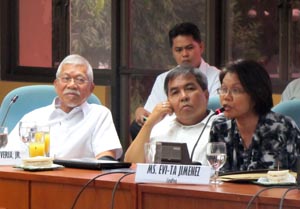
Evi-ta Jimenez, Lito Averia, and Gus Lagman
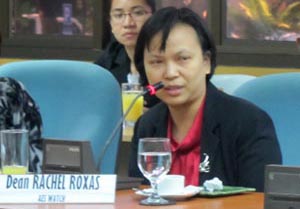
Dr. Rachel Roxas
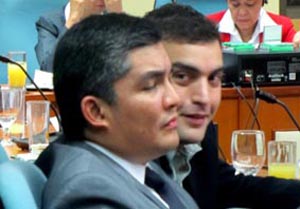
Comelec Commissioner Gregorio Larrazabal and Smartmatic’s Cesar Flores
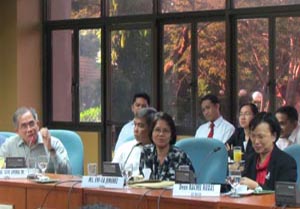
Rachel Roxas, Evi-ta Jimenez, Lito Averia, and Bobby Tuazon
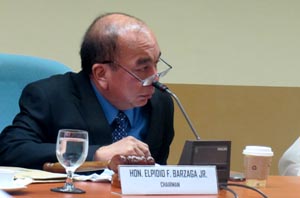
Congressman E. Barzaga, Jr.
- Probing presidential platforms
- Conference calls for people-centered policy actions for Asian development and peace
- WWII 'comfort women' urge visiting Japanese emperor: OFFICIAL GOV’T APOLOGY, UPHOLD TRUTH, and JUST COMPENSATION
- FEARLESS FORECAST (EPISODE II): Comelec will not comply with e-Commerce Law in 2016 elections
- Fearless forecast: Comelec’s non-compliance with the AES law in 2016 (last of 2 parts)
- Fearless forecast: Comelec will not comply with the AES law in 2016
- CenPEG releases travelogue
- Experts: Nuisance bets reflect disillusionment, uneven playing field
- Partylist solon presses for tax cuts
- The True Cost of a Political Campaign
- Management decisions: Based on RA 9369 or purely Comelec’s?
- CenPEG holds 1st roundtable with media on presidential poll results
- Filipino IT can do it!
- FIT4E: The only transparent solution
- Realpolitik in the maritime tiff
- China’s challenge to PH sovereignty
- Choosing the next president
- Fixing the presidency, reforming the state
- New Comelec chair says he’s open to other election technologies
- SC ruling on AES Watch Pabillo and IBP vs Comelec, Smartmatic-TIM
- Comelec must explain P3.2B unliquidated cash advances
- CONGRESS ASKED TO HOLD DEMO ON PCOS HACKING
- 25 Bishops ask poll body to stop midnight deal with Smartmatic
- Pope Francis: reform and conversion
- 2 poll watch coalitions stage rally vs Comelec-Smartmatic midnight deal
- AES Watch questions Comelec-Smartmatic midnight deal
- ASEAN-India: Building Youth Partnerships through Culture and Entrepreneurship
- CenPEG forges research exchange and partnership with Jinan University
- FOI: Bearing fruit or foiled again?
- Remittance with Representation: The right to vote of overseas Filipinos
Center for People Empowewrment in Governance (CenPEG), Philippines. All rights reserved


